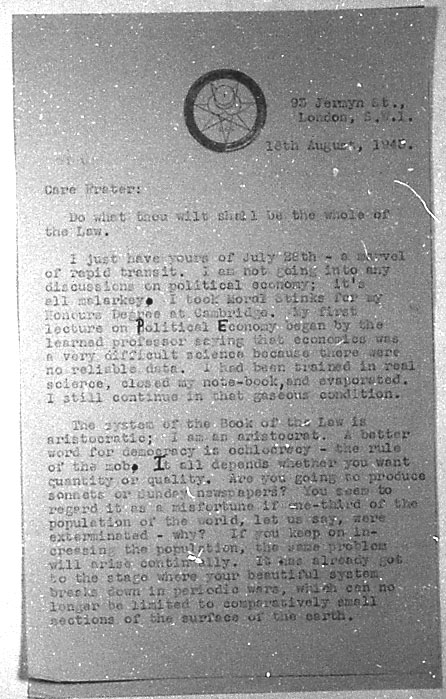
93 Jermyn St.
London, S.W.1
18th August, 1943.
Care Frater:
Do what thou wilt shall be the whole of the Law.
I just have yours of July 28th as a marvel of rapid transit. I am not going into any discussions on political economy; it’s all malarkey. I took Moral Stinks for my Honours Degree at Cambridge. My first lecture on Political Economy began by the learned professor saying that economics was a very difficult science because there were no reliable data. I had been trained in real science, closed my note-book, and evaporated. I still continue in that gaseous condition.
The system of the Book of the Law is aristocratic; I am an aristocrat. A better word for democracy is ochlocracy — the rule of the mob. It all depends whether you want quantity or quality. Are you going to produce sonnets or Sunday newspapers? You seem to regard it as a misfortune if one-third of the population of the world, let us say, were exterminated — why? If you keep on increasing the population, the same problem will arise continually. It has already got to the stage where your beautiful system breaks down in periodic wars, which can no longer be limited to comparatively small sections of the surface of the earth.
You should read the book called “Ouroboros” by G. Garrett, published by Kegan Paul. The author shews very clearly how the multiplication table has upset civilisation; you might draw a parallel between the present-day and the fall of the Roman Empire, when the Pax Romana had suddenly made the world smaller, at the same time hindering Nature’s method of elimination of the unfit. The result is being repeated before our eyes. It always happens when a new Magus appears with a new Word for a new Aeon.
You are too young to have known the world when it was worth living in. I assure you that I have known quite a number of men, and women too, in quite humble circumstances, quite ignorant by modern standards of sham education, who are magnificent specimens physically, having been brought up on natural food, and fortified by reasonably hard work in natural conditions. Such people were individuals, with characters. It is almost impossible to find any such today. Look at your own immediate circle; listen to their conversation; they have no opinions but what they have got from their newspapers; they have no ideas of their own. Even you, who are by way of being a poet, shew no evidence of original thought on these subjects. But at least you are trying to think, and no doubt you will one day grow up.
One point which you have failed to see is that a man’s daily work should develop his character; the mechanical repetition of a brainless job does the exact opposite. You have got obsessed by the modern ignorant idea that education is a matter of learning, that books are the great teachers; you seem unable to conceive of any other form of development. I think your time in the desert ought to do you good; but I will ask you to take careful note of the conversation of your associates. A few of them may have vaguely formulated ideas, a lot of big words such as I am sorry to say you use yourself when you start writing about economics, in which I regret to say you do not appear to be an expert, even judged by conventional standards; but you will find, if you observe carefully, that it is all smeared over with the superficial prattle of newspaper talk. The result has been that everywhere, but especially in England and America, men are quite unable to distinguish between good work and bad, except for the purpose of kicking out the good.
This pedantic nonsense is not you at all; your poetry is very much better. The samples you have sent me I have not yet had time to read as carefully as I should wish; but on a casual perusal, they seem to shew considerable advance on previous efforts. But do be careful, dear boy; you write ‘the Secret of Arcanum’ — Arcanum is merely the latin word for ‘secret’; it makes the poem nonsense. Never mind — not only will you grow up, but you are growing.
Love is the law, love under will
Yours sincerely,
{signed} Aleister Crowley
Note: In British schoolboy slang, “stinks” signifies chemistry or science and “moral science” signifies the humanities. Originally published in Thelema Lodge Calendar, April 2001.
Note: Thank you to William Heidrick for making these images available.



